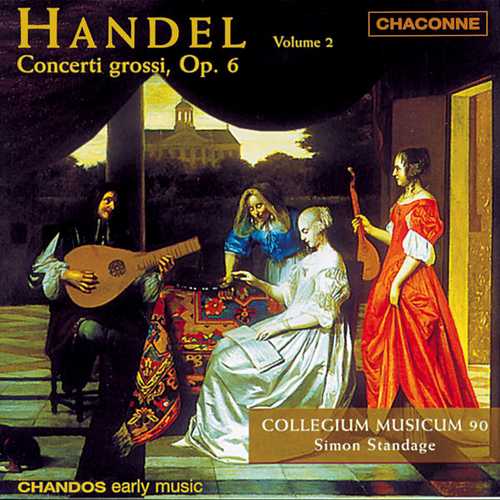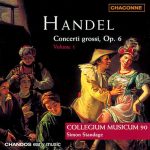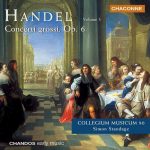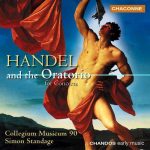
Composer: George Frideric Handel
Orchestra: Collegium Musicum 90
Conductor: Simon Standage
Format: FLAC (tracks)
Label: Chandos
Catalogue: CHAN0616
Release: 1998
Size: 311 MB
Recovery: +3%
Scan: cover
Concerto grosso, Op. 6 No. 6 in G minor, HWV324
01. I. Largo affettuoso
02. II. A tempo giusto
03. III. Musette: Larghetto
04. IV. Allegro
05. V. Allegro
Concerto grosso, Op. 6 No. 7 in B flat major, HWV325
06. I. Largo
07. II. Allegro
08. III. Largo e piano
09 .IV. Andante
10. V. Hornpipe
Concerto grosso, Op. 6 No. 8 in C minor, HWV326
11. I. Allemande
12. II. Grave
13. III. Andante allegro
14. IV. Adagio
15. V. Siciliana: Andante
16. VI. Allegro
Concerto grosso, Op. 6 No. 9 in F major, HWV327
17. I. Largo
18. II. Allegro
19. III. Larghetto
20. IV. Allegro
21. V. Menuet
22. VI. Gigue
The first disc of the ever-fresh Op 6 Concertigrossi includes the oboe parts that Handel later added to Nos 1, 2, 5 and 6. The performances are brimful of vitality, and the clean articulation and light, predominantly detached style give the music buoyancy and help to bring out Handel’s often mischievous twinkle in the eye. Speeds are generally brisk, with boldly vigorous playing, but Standage’s team can also spin a tranquil broad line. Dynamics throughout are subtly graded, and except in one final cadence ornamentation is confined to small cadential trills.
On the second disc, except, in the sombre colours in the splendid G minor Concerto (No 6) – here with oboe and the agreeable addition of a theorbo to the continuo – there’s a general air of cheerfulness that’s most engaging. The fugue in No 7 is wittily buoyant, the Allegro in No 9, borrowed from the Cuckoo and the nightingale Organ Concerto, could scarcely be more high-spirited, the final Passepied of No 6 and the Hornpipe of No 7 are spring-toed; and Standage’s feeling for convincing tempos is nowhere better shown than in the long Musette of No 6, which in other hands can drag. Phrasing everywhere is shapely, and the surprise chords that interrupt the flow of No 8’s Allemande are admirably ‘placed’.
On the final disc the playing is always on its toes – positively twinkling in dance movements such as the concluding fugal gigue of No 12.
The last two concertos, No 11 in particular, give Simon Standage an opportunity to shine as a soloist; his ad lib sections are tastefully done, without excesses; his semiquavers in the variants of the A major Andante are feather-light. All dynamics are well contrasted in a natural way, and the tempos nicely judged; a slightly faster repeat of the first half of No 10’s fifth movement suggests the splicing of a different take. As a fillup, we’re presented with the Alexander’s Feast concerto grosso, for which the string group is joined by oboes and bassoon. The excellent concertino of two violins and cello is thrown into high relief and the Allegro movements are performed with a delightful spring.



